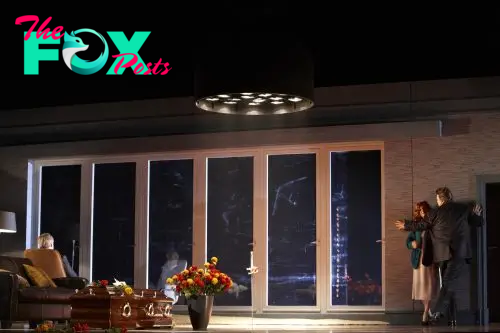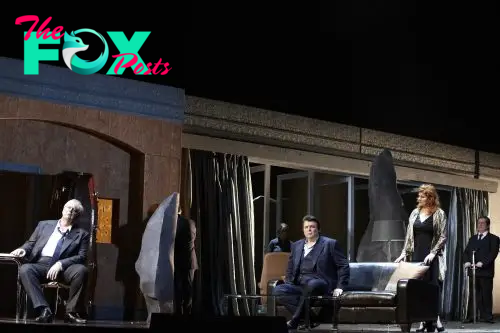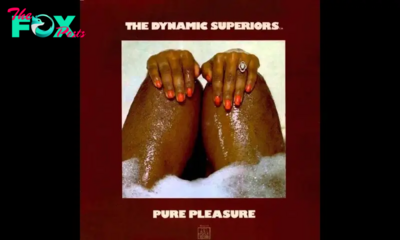Entertainment
A deeply disappointing Tristan und Isolde on the Deutsche Oper Berlin ŌĆō Seen and Heard Worldwide
 Germany Wagner, Tristan und Isolde: Soloists, Refrain (director: Thomas Richter) and Orchestra of the Deutsche Oper Berlin / Juraj Val─Źuha (conductor). Deutsche Oper Berlin, 3.7.2024. (MB)
Germany Wagner, Tristan und Isolde: Soloists, Refrain (director: Thomas Richter) and Orchestra of the Deutsche Oper Berlin / Juraj Val─Źuha (conductor). Deutsche Oper Berlin, 3.7.2024. (MB)

Manufacturing:
Director ŌĆō Graham Vick
Designs ŌĆō Paul Brown
Lighting ŌĆō Wolfgang G├Čbbel
Solid:
Tristan ŌĆō Michael Weinius
King Marke ŌĆō G├╝nther Groissb├Čck
Isolde ŌĆō Ricarda Merbeth
Kurwenal ŌĆō Leonardo Lee
Melot ŌĆō J├Črg Sch├Črner
Brang├żne ŌĆō Irene Roberts
Shepherd ŌĆō Clemens Bieber
Younger Sailor ŌĆō Kieran Carrel
Steersman ŌĆō Byung Gil Kim
And so, the Deutsche OperŌĆÖs season, through which it has proven all ten of WagnerŌĆÖs ŌĆśBayreuthŌĆÖ works, begins to attract to a detailed. I’ve not managed to see all of them; accidentally moderately than design, I’ve seen the present productions of the seven ŌĆśmusic dramasŌĆÖ, however missed these of The Flying Dutchman, Tannh├żuser, and Lohengrin (all of which I’ve seen earlier than). Of these I noticed, all however Philipp St├ČlzlŌĆÖs Parsifal (right here) have been new to me. Stefan HerheimŌĆÖs Ring I greeted (right here) enthusiastically, although not with out reservations, in Could; the Wieler-Viebrock-Morabito Meistersinger much less so (right here), although it had its moments. How would the late Graham VickŌĆÖs 2011 Tristan, which someway I had missed till now, fare?
Disappointingly, I’m afraid. Perhaps I used to be not in the correct temper, although it was definitely not solely that, however I don’t suppose I’ve ever felt much less engaged, and even , in a efficiency of what ought to all the time be a piece like no different, on the sting of the potential but in addition of what one can bear. I likely quote this letter from Wagner to Mathilde Wesendonck too typically, but nevertheless drama-queenish the expression, the precept stays sound, or at the least readily understandable: ŌĆśI worry the opera might be banned ŌĆō except the entire thing is parodied in a nasty efficiency ŌĆō: solely mediocre performances can save me! Completely good ones might be certain to drive individuals mad, ŌĆō I can not think about it in any other case.ŌĆÖ As soon as once more, sanity regrettably endured.
Allow us to start with VickŌĆÖs manufacturing, at which I really feel in a position solely to throw my fingers into the hair and say (well mannered model): goodness is aware of. One can admire his extraordinary work in Birmingham and certainly some or a lot of his stagings, with out having a lot concept what’s going on right here and, extra sadly, with out with the ability to care very a lot. Is it maybe all a drug-induced dream, Dallas assembly Trainspotting? One of many only a few (by itself phrases) theatrically convincing moments, presaged by a disturbing look (certainly one of many, from a forged of irritating extras) by a shaking, wall-hugging addict, is when Tristan and Isolde inject themselves for what appears, even sounds, to be that elusive excellent hit. Who they’re, although, and what they’re doing in one thing that could be a home or could also be a funeral parlour (MoroldŌĆÖs funeral, I believed to begin with, although the coffin certainly stays too lengthy) is anybodyŌĆÖs guess. All method of unusual individuals come and go. A gang of menacing males within the first act suggests an strategy based, oddly, upon gender, when certainly the entire level is the irrelevance of the outstanding world, however it’s quickly gone anyway.
So too are the lady who walks round bare and, within the second act, exterior within the backyard (albeit with an indoor hearth), a male bare gravedigger. Maybe it’s scorching on the market, and TristanŌĆÖs overcoat is a product of his habit. He and Isolde sit on the couch for many of it, as if watching the tv; they appear to have little curiosity in one another. A torch-cum-gigantic-peppermill typically comes into view above, although it doesn’t appear aligned to the night time/day axis. Infrequently, a lady in an adjoining room does the ironing. The Steersman makes his look bursting out of the toilet in mid-shave. All of it ends, banally sufficient, with Isolde, spying some extra individuals strolling across the backyard, opening the door to hitch them. Fairly. That the motion on this ŌĆśmotionŌĆÖ (Handlung) is fully metaphysical appears to have eluded Vick, because it does many, however this lacks a lot as a touch of coherence by itself phrases. I believe the purpose, or at the least a level, could also be that they’ve grown outdated within the meantime; with that, at the least, one can sympathise.

The true drama lies within the orchestra, after all, or ought to. There have been passages of relative fluency among the many relaxation from Juraj Val─Źuha, however that’s about the very best one can say. As a rule, we had audible gear adjustments, surprisingly skinny strings, odd balances, defective ensemble, and a lethal tendency all through every act to decelerate. The second act felt interminable, while TristanŌĆÖs third-act agonies amounted to little greater than a prolonged record of non sequiturs. The Orchestra of the Deutsche Oper, usually excellent in Wagner, sounded as if it had had sufficient; I can not blame it.
Ricarda MerbethŌĆÖs Isolde had a lot to commend it, particularly within the first act. She made quite a lot of the phrases, providing a masterclass in scorn, although sustaining a line appeared much less of a precedence. Hans von B├╝lowŌĆÖs declare that that is WagnerŌĆÖs bel canto opera is as foolish because it sounds, however that doesn’t imply there is no such thing as a melodic curiosity within the vocal line. Nonetheless, she outshone her Tristan, Michael Weinius, who had seemingly countless vocal reserves to name on. Given how shouted and unvariegated they have been, it was tempting typically to want that he had not; this was neither bel nor canto, and his performing was at finest gestural. Leonardo LeeŌĆÖs Kurwenal bloomed into what, alongside G├╝nther Groissb├ČckŌĆÖs fantastically sung, finely detailed Marke, was certainly the best efficiency of the night time. Irene Roberts (Brang├żne) sang nicely too, although a bit extra mezzo-ish depth wouldn’t have gone amiss, particularly in order to distinction with Isolde. Given what the singers have been offered with, although, it could be churlish to complain additional.
Wagner, then, was saved once more. Subsequent cease: Bayreuth, together with a brand new Tristan. Fingers crossed for a bit insanity.
Mark Berry
-

 Entertainment3h ago
Entertainment3h agoHow Gladiator II Connects to the Original Gladiator
-

 Entertainment8h ago
Entertainment8h ago3 Completely different Kinds of TV Appearing Roles
-

 Entertainment8h ago
Entertainment8h agoAmerica On CoffeeWeŌĆÖre simply inviting you to take a timeout into the rhythmic ambiance of our breakfast, brunch and/or espresso alternatives. WeŌĆÖre comfortable everytime you cease by.SYRUPING UP YOUR VERY OWN COFFEE FLAVORS
-

 Entertainment8h ago
Entertainment8h agoMeet Ava, the Golden Tiger Cub in Thailand Set to Be the Next Cute Viral Sensation
-

 Entertainment8h ago
Entertainment8h agoBest Tom Hardy Movies that Are Must-Watch
-

 Entertainment13h ago
Entertainment13h agoThe Smithereens with John Hampson ŌĆō West Herr Riviera Theatre ŌĆō North Tonawanda, NY ŌĆō November 20, 2024
-

 Entertainment18h ago
Entertainment18h agoAmerica On CoffeeWeŌĆÖre simply inviting you to take a timeout into the rhythmic ambiance of our breakfast, brunch and/or espresso alternatives. WeŌĆÖre comfortable everytime you cease by.Vacation Espresso Cocktail
-

 Entertainment18h ago
Entertainment18h ago12 Methods to Command a Stage
















